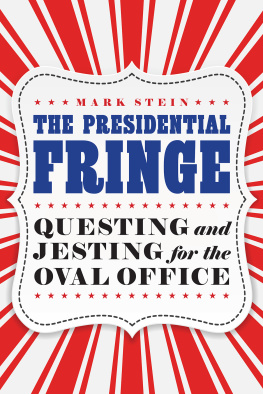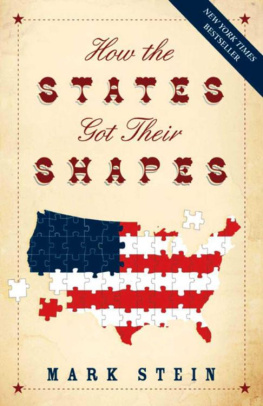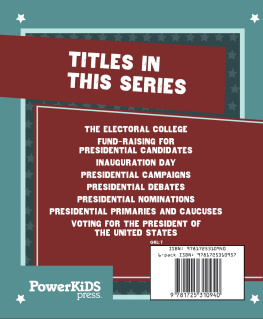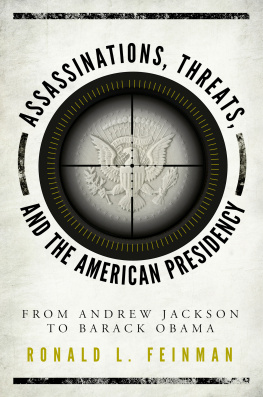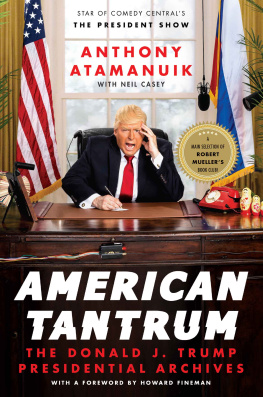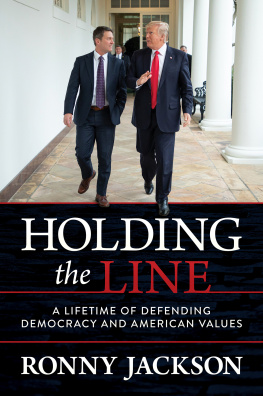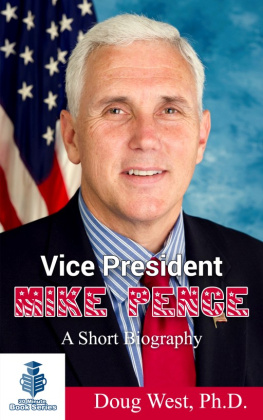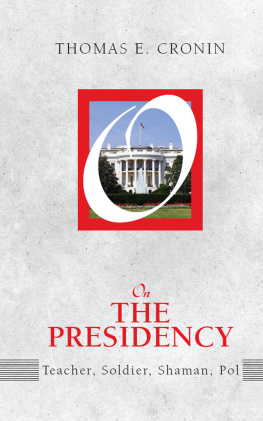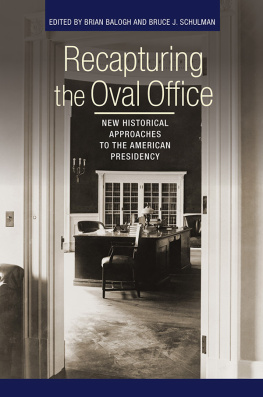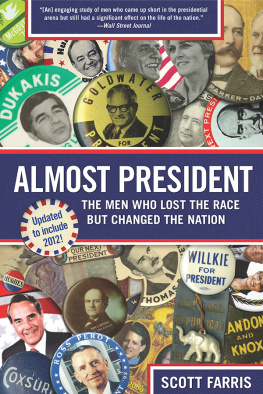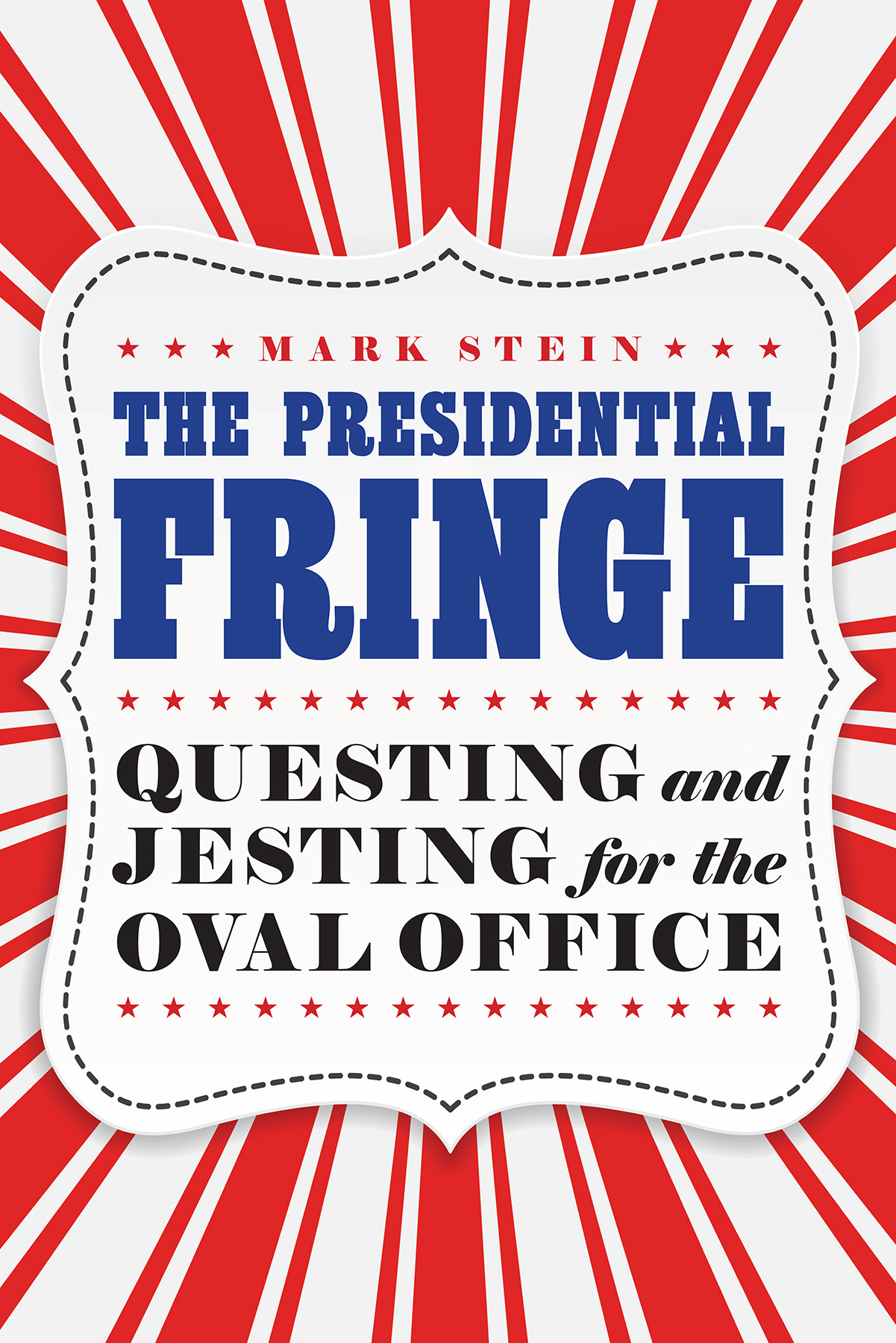
Mark Stein once again holds a brilliant mirror up to American society and history, this time refracted through the lens of fringe presidential candidates, ranging from the profound to the pathetic. In humorous, incisive, and telling narratives, he shows us that two of our most enduring national traits are optimism and hope.
Mark Olshaker, coauthor of Mindhunter and Deadliest Enemy
If ever there was a time to seriously consider the value of candidates who lampoon our electoral system, it is now during the presidency of Donald Trump. Outrageous claims, promises that can never be kept, and shameless, self-serving tactics to win attention at all coststhe candidates described in this book have done it all before. Perhaps if we had understood these candidates efforts, we wouldnt have the current clown in the Oval Office. This book gives us the chance to reexamine our democratic traditions, and nothing could be more timely.
Gabriel Gomez, professor of education at Chicago State University and co-producer/director of the Drag In for Votes documentary on the presidential campaign of Joan Jett Blakk
Praise for Mark Steins previous work:
For How the States Got Their Shapes:
What could easily be dismissed as popular trivia achieves a scholarly weight by the accuracy of detail and the insights into the cultural dynamics of state-boundary formation.
Geographical Review
For Vice Capades: Sex, Drugs, and Bowling from the Pilgrims to the Present:
There is something amusing, but also intriguing, about seeing examples from history of people working themselves up into a righteous frenzy of alarm and condemnation about, say, juggling.... Protectors of the status quo who feel confident in their cause tend to reveal their own self-interest in blatant ways.
Scott McLemee, Inside Higher Ed
Witty and opinionated insight on how bad behavior can morph into, and out of, and back into favor over the course of time.
Kirkus Reviews
Mark Stein utilizes a humor-based approach to tracing the lengthy history of vice control in the United States.
Steven Block, Criminal Law and Criminal Justice Books
Vice Capades exposes our racist and sexist history but reads like a Jon Stewart segment.
Marianne Noble, author of The Masochistic Pleasures of Sentimental Literature
Mark Stein once again shines brilliant light on who we really are as a nation and people.
Mark Olshaker, coauthor of Mindhunter and Law and Disorder
This is classic Mark Stein: funny and wise and full of verve. An erudite and fun read.
Bob Davis, coauthor of Prosperity
For Direct from Death Row, the Scottsboro Boys:
A work of searing truth and staggering theatricality, this Midwest premiere of Mark Steins important, ingeniously conceived playwith a wonderfully warped use of traditional songs, plus original music and lyrics by Harley White Jr.is a magnificent achievement.
Hedy Weiss, Chicago Sun-Times
For American Panic: A History of Who Scares Us and Why:
An informative tour through some of the countrys most notable spasms of fear.
Wall Street Journal
For Housesitter:
Pound for pound there are more laughs to be had from [Housesitter] than one might expect... mainly due to Mark Steins nicely turned screenplay which is skillfully delivered by Steve Martin and Goldie Hawn.
Cinephilia
Housesitter wins the cigar as the decades most imaginative screwball comedy.
USA Today
The Presidential Fringe
Questing and Jesting for the Oval Office
Mark Stein
Potomac Books
An imprint of the University of Nebraska Press
2020 by Mark Stein
Cover designed by University of Nebraska Press; cover image iStock.com / pialhovak.
Author photo courtesy of the author.
All rights reserved.
Potomac Books is an imprint of the University of Nebraska Press.
Library of Congress Cataloging-in-Publication Data
Names: Stein, Mark, 1951 author.
Title: The presidential fringe: questing and jesting for the Oval Office /
Mark Stein.
Description: [Lincoln, Nebraska]: Potomac Books, an imprint of the University of Nebraska Press, [2020] | Includes bibliographical
references and index.
Identifiers: LCCN 2018003952
ISBN 9781640120327 (cloth: alk. paper)
ISBN 9781640121232 (epub)
ISBN 9781640121249 (mobi)
ISBN 9781640121256 (pdf)
Subjects: LCSH : Presidential candidatesUnited StatesBiography. | PresidentsUnited StatesElectionHistory. | United StatesPolitics
and government.
Classification: LCC E 176 . S 835 2020 | DDC 324.973 324.973dc23
LC record available at https://lccn.loc.gov/2018003952
The publisher does not have any control over and does not assume any responsibility for author or third-party websites or their content.
Contents
First and foremost (and yet again) I want to thank Arlene Balkansky at the Library of Congress Serial and Government Publications Division for assistance with newspaper and magazine articles and with providing guidance through the maze of extraordinary materials in the various divisions of the Library of Congress, as well as guidance through lifes maze for forty-plus years of marriage.
I also want to thank her colleagues, Eric Frazier from the Rare Book and Special Collections Division of the Library of Congress and, at the Federal Election Commission, Christian Hilland. Little-known fact: federal employees such as these are part of a workforce that, given its enormity, is efficient and helpful far more often than notindeed far more often than other huge organizationsand far too often unjustly maligned.
For similarly valuable assistance at other libraries, I am grateful to Jennifer Bibb from the Special Collections Division of the University of North Florida; Joanne Bloom, photographic resources librarian at Harvard University Fine Arts Library; and American Universitys Bender Library for extending borrowing privileges to me.
As in the past, my agent, Alec Shane, provided insights and posed questions that were of immeasurable value in my finding the common denominator that linked the variety of fringe candidates included in this book. Similarly I am once again grateful to my editor at the University of Nebraska Press/Potomac Books, Tom Swanson, for spotting, amid the upheaval of the 2016 election, the value of exploring fringe candidates. My thanks as well to the entire team at University of Nebraska Press, with whom it has once again been a pleasure to work, with a particular shout-out to Mark Heineke for his input and special appreciation to copyeditor Judith Hoover for catching countless missteps without stepping on tone.
My thanks also to those whose comments, suggestions, questions, or answers to questions greatly aided me: Pat Behling, Bari Biern, Elizabeth Copeland, Daniel L. Goldberg, Bastian Hermisson, Bryan McGovern, Eric Meyers, and (alphabetically last but far from least) Harry Stein.
In 1848 John Donkey, a cartoon character (unrelated to the donkey that later represented the Democratic Party), announced his candidacy for the presidency.
The supporters of the fictional John Donkey for president and of Zachary Taylors horse for vice president were, in fact, serious in their ridiculousness. If nothing else (though there was something else), they saw the circus that elections were becoming a few decades after the nations birth. These fringe candidates who campaigned as clowns sought to call the nations attention to this unfunny danger by taking the stage with the political equivalent of a big red nose. The more that mainstream candidates behaved as political equivalents of P. T. Barnum, the patriarch of American hucksters, the more clown candidates honked their noses.
Next page
